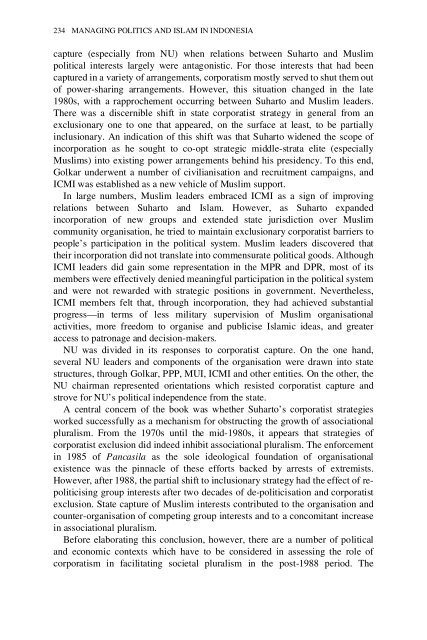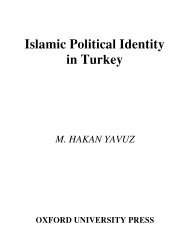Create successful ePaper yourself
Turn your PDF publications into a flip-book with our unique Google optimized e-Paper software.
234 MANAGING POLITICS AND ISLAM IN INDONESIAcapture (especially from NU) when relations between Suharto <strong>and</strong> Muslimpolitical <strong>in</strong>terests largely were antagonistic. For those <strong>in</strong>terests that had beencaptured <strong>in</strong> a variety of arrangements, corporatism mostly served to shut them outof power-shar<strong>in</strong>g arrangements. However, this situation changed <strong>in</strong> the late1980s, with a rapprochement occurr<strong>in</strong>g between Suharto <strong>and</strong> Muslim leaders.There was a discernible shift <strong>in</strong> state corporatist strategy <strong>in</strong> general from anexclusionary one to one that appeared, on the surface at least, to be partially<strong>in</strong>clusionary. An <strong>in</strong>dication of this shift was that Suharto widened the scope of<strong>in</strong>corporation as he sought to co-opt strategic middle-strata elite (especiallyMuslims) <strong>in</strong>to exist<strong>in</strong>g power arrangements beh<strong>in</strong>d his presidency. To this end,Golkar underwent a number of civilianisation <strong>and</strong> recruitment campaigns, <strong>and</strong>ICMI was established as a new vehicle of Muslim support.In large numbers, Muslim leaders embraced ICMI as a sign of improv<strong>in</strong>grelations between Suharto <strong>and</strong> <strong>Islam</strong>. However, as Suharto exp<strong>and</strong>ed<strong>in</strong>corporation of new groups <strong>and</strong> extended state jurisdiction over Muslimcommunity organisation, he tried to ma<strong>in</strong>ta<strong>in</strong> exclusionary corporatist barriers topeople’s participation <strong>in</strong> the political system. Muslim leaders discovered thattheir <strong>in</strong>corporation did not translate <strong>in</strong>to commensurate political goods. AlthoughICMI leaders did ga<strong>in</strong> some representation <strong>in</strong> the MPR <strong>and</strong> DPR, most of itsmembers were effectively denied mean<strong>in</strong>gful participation <strong>in</strong> the political system<strong>and</strong> were not rewarded with strategic positions <strong>in</strong> government. Nevertheless,ICMI members felt that, through <strong>in</strong>corporation, they had achieved substantialprogress—<strong>in</strong> terms of less military supervision of Muslim organisationalactivities, more freedom to organise <strong>and</strong> publicise <strong>Islam</strong>ic ideas, <strong>and</strong> greateraccess to patronage <strong>and</strong> decision-makers.NU was divided <strong>in</strong> its responses to corporatist capture. On the one h<strong>and</strong>,several NU leaders <strong>and</strong> components of the organisation were drawn <strong>in</strong>to statestructures, through Golkar, PPP, MUI, ICMI <strong>and</strong> other entities. On the other, theNU chairman represented orientations which resisted corporatist capture <strong>and</strong>strove for NU’s political <strong>in</strong>dependence from the state.A central concern of the book was whether Suharto’s corporatist strategiesworked successfully as a mechanism for obstruct<strong>in</strong>g the growth of associationalpluralism. From the 1970s until the mid-1980s, it appears that strategies ofcorporatist exclusion did <strong>in</strong>deed <strong>in</strong>hibit associational pluralism. The enforcement<strong>in</strong> 1985 of Pancasila as the sole ideological foundation of organisationalexistence was the p<strong>in</strong>nacle of these efforts backed by arrests of extremists.However, after 1988, the partial shift to <strong>in</strong>clusionary strategy had the effect of repoliticis<strong>in</strong>ggroup <strong>in</strong>terests after two decades of de-politicisation <strong>and</strong> corporatistexclusion. State capture of Muslim <strong>in</strong>terests contributed to the organisation <strong>and</strong>counter-organisation of compet<strong>in</strong>g group <strong>in</strong>terests <strong>and</strong> to a concomitant <strong>in</strong>crease<strong>in</strong> associational pluralism.Before elaborat<strong>in</strong>g this conclusion, however, there are a number of political<strong>and</strong> economic contexts which have to be considered <strong>in</strong> assess<strong>in</strong>g the role ofcorporatism <strong>in</strong> facilitat<strong>in</strong>g societal pluralism <strong>in</strong> the post-1988 period. The




